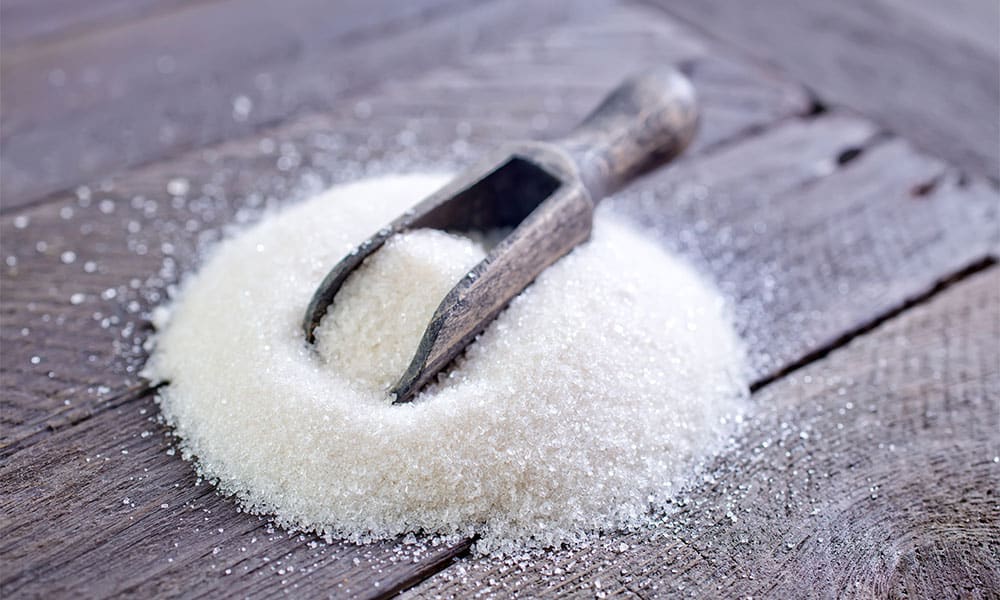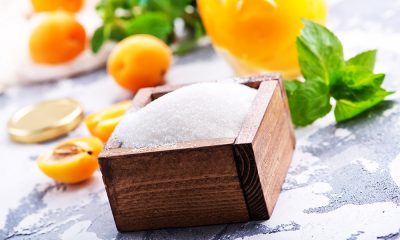Wellness
Eat Less Sugar: Dare to Be Sugar Free
We’re eating more sugar than our bodies can handle, but we can change that.

The problem: Sugar overload. We are eating 40-80kg (88-176 lbs) of added sugar every year. That is 4-8 times more sugar than our bodies can handle!!
World Health Organization, American Heart Association and SugarScience recommend a cut to max 5% added sugar. What does that really mean? To get down to those numbers we will need to cut our sugar consumption in half, and then half, and for some, half again. This will bring us back to the 10 kg (22 lbs) added sugar that we ate 100 years ago and the 5% of caloric value recommended by World Health Organization.
What is sugar?
First, we need to define what sugar is. What we really are eating too much of is glucose and fructose. Glucose is the main form of sugar that our body uses. Fructose needs to be turned into glucose by the liver. The white table sugar we normally think of as sugar is called sucrose, which is half fructose and half glucose. These simple sugars are being put into almost every product on the shelf, organic products included, and under a variety of names.
Glucose – The simple sugar that our body basically runs on. Our bodies can get glucose from what we eat, even vegetables and proteins. The problem with glucose is too much and too much at one time, so when it’s added to what we eat, it easily becomes too much.
Fructose – Found in varying amounts in fruit. This sugar needs to be converted in the liver to be used by the body. Too much overloads the liver and is toxic to the body. Again the problem is too much and too much at one time.
Sucrose (sugar) – this is standard white table sugar. It’s actually a combination of glucose and fructose. Both of the above are true for sucrose. Again the problem is too much and too much at one time. Our bodies do not need added sugar since sugar is already found naturally in both vegetables, berries and fruits.
Most common names of sugar:
- sugar
- glucose
- fructose
- sucrose
- HFCS (high fructose corn syrup)
- honey*
- agave syrup*
- coconut sugar or nectar*
- dextrose
- fruit sugar
- maple syrup*
- molasses*
- yacon syrup*
- maltodextrin (technically not a sugar, but is the fastest carbohydrate available and acts like sugar in the body)
* These are healthier alternatives to sugar, but they still are sugar (70-98% glucose/fructose). These are still a blend of glucose, sucrose and fructose. The problem with these “better” sugars is that we don’t just need healthier sugars, we need to make a dramatic change in decreasing the amount of sugar we are eating, which includes all of these.
Not only these, but some carbohydrates (fast carbs) act like sugar in the body. They create a blood sugar high, which then crashes, like after eating sugar. Fast carbs provide little or no nutrition, are a sugar stress on your body, and can make you hungrier. Focusing on healthy protein and fats with each meal will help nourish your body and keep you full longer. Replacing grains and fast carbs with more vegetables (if your gut tolerates them) is also a fun and simple solution for many! Ever heard of cauliflower rice, bean pasta, or zucchini lasagna?
Sugar & your immune system
Both our diet and stress level affect our immune system more than we know. Vitamin C is a powerful antioxidant that strengthens the immune system. Both sugar and stress prevent vitamin C absorption.
Vitamin C and glucose use the same pathway to come up into the cells, but glucose is the stronger one and comes in first. As long as you eat a lot of sugar or fast carbs, it will be glucose that gets first priority and vitamin C gets to wait for its turn.
When you’re stressed, the stress hormone cortisol triggers more glucose to be released into the blood stream, which in turn makes it more difficult for the body to absorb vitamin C. If your body has a difficult time absorbing vitamin C, it can lead to a weakened immune system.
Sugar doesn’t kill and doesn’t diminish the white blood cells in the body, but sugar does makes them weaker, and they may not be able handle infections the same way as they should.
There are studies showing that sugar intake affects your immune system many hours, even days after consumption. Is it worth it? Is it worth those pieces of candy or that soda to get a higher risk of getting sick? And not just a higher risk of getting sick in the future. High sugar intake does increase the risk of a lot of modern disease, and sadly many people don’t want to think that far with their health, but we’re also talking today, every day, every week. Is it worth that sugar to have higher risk of getting sick right now?
What’s so positive is that there are so many good alternatives! For example, start using xylitol, stevia, or monk fruit when you bake or make ice cream, and choose very dark chocolate the next time you’re craving chocolate, instead of normal “dark” chocolate that still contains around 30% added sugar.
Sugar and oxidative stress
Sugar increases the amount of oxidative stress on your body. Sugar causes stress in the body and stress causes sugar cravings. It can be a vicious cycle that’s hard to break, but it absolutely is possible!

Wellness
Beneath the Layers

In the beginning of the journey of work clients and I venture on, the surface issues and discussions are initially “just surface.”
In fitness, when there’s a movement a client cannot perform after much practice and polishing, the first thought is that they just can’t do it. Soon enough, we discover their central nervous system has protected their body from moving in that specific manner, because there is a limiting belief and limiting decision their central nervous system and their unconscious mind have a greed upon. And it has defined itself as “safety.”
When clients want to lose weight, we later on discover the emotional un-resolve rooted in eating patterns inhibiting them from their success of doing so. Sometimes, more often than others, there’s systematic problems inhibiting digestion promoting bloating, infections wreaking havoc, and the list goes on.
Mental blocks become obvious as we begin to peel away the layers. We eventually become acquainted that the behavioral “issues” desired to be changed, are very obvious physical symptoms or manifestations breeding beneath deeper layers.
There’s a lot of “stuff” we stuff. That “stuff” will introduce itself to you and the world around you, eventually. Self preservation can feel “safe” and comfortable. But it is unsustainable. Eventually the totality of us, will beg to be resolved. Lean in listen and learn. Eventually you will heal.
“We will project that which is unconscious in the most obvious of ways in order to become consciously aware which is most unconscious so we can gain the learning necessary to get results.”- Nathan Rossi

 Wellness6 years ago
Wellness6 years agoHow to Talk to Your Kids About Sugar

 Wellness5 years ago
Wellness5 years agoBeneath the Layers

 Wellness7 years ago
Wellness7 years agoThe Sugar Story Children’s Book – Teaching Kids About Sugar

 Purpose5 years ago
Purpose5 years agoNever Let Technology Keep You from Your Dream!

 Wellness7 years ago
Wellness7 years ago5 Myths About Xylitol

 Lifestyle6 years ago
Lifestyle6 years agoOrganic, Sustainable, Non-Toxic Vacation Homes!

 Lifestyle6 years ago
Lifestyle6 years ago5 Ways to Make Your Next Hotel Stay Healthier

 Unrecipe7 years ago
Unrecipe7 years agoSuper Simple Apple Cake























